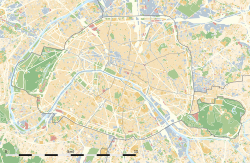Paris VI University
| UPMC – Sorbonne Universités | |
 |
|
| Type | Public |
|---|---|
| Established | 1 January 1971 |
| Budget | 400 million euros |
| President | Jean Chambaz |
|
Academic staff
|
7,000 |
|
Administrative staff
|
10,640 |
| Students | 32,000 |
| Location |
Paris, France 48°50′50″N 2°21′23″E / 48.847222°N 2.356389°ECoordinates: 48°50′50″N 2°21′23″E / 48.847222°N 2.356389°E |
| Campus | Urban |
| Nickname | University of Paris VI |
| Affiliations | Sorbonne University,CNRS,LERU, EUA |
| Website | www |
| University rankings | |
|---|---|
| Global | |
| ARWU | 36 |
| Times | 113 |
| QS | 137 |
| Europe | |
| ARWU | 7 |
| Times | 50 |
| QS | 57 |
Pierre and Marie Curie University (French: Université Pierre-et-Marie-Curie; abbreviated UPMC), also known as University of Paris VI, is a public research university and was established in 1971 following the division of the University of Paris (Sorbonne), and is a principal heir to Faculty of Sciences of the Sorbonne (French: ), although it can trace its roots back to 1109 and the Abbey of St Victor.
The university is located on the Jussieu Campus in the Latin Quarter of the 5th arrondissement of Paris, France. The French cultural revolution of 1968, commonly known as "the French May", resulted in the division of the world's second oldest academic institution, the University of Paris, into thirteen autonomous universities.
UPMC is the largest scientific and medical complex in France, active in many fields of research with scope and achievements at the highest level, as demonstrated by the many awards regularly won by UPMC researchers, and the many international partnerships it maintains across all five continents. Several university rankings have regularly put UPMC at the 1st place in France, and it has been ranked as one of the top universities in the world. The ARWU (2014) has ranked UPMC as the 1st in France, 6th in Europe and 35th in the world and also 4th in field of mathematics, 25th in field of physics, 14th in field of natural sciences and 32nd in field of engineering, technology and computer science.
It has more than 125 laboratories, most of them in association with the Centre national de la recherche scientifique (CNRS). Some of its most notable institutes and laboratories include the Institut Henri Poincaré, Institut d'astrophysique de Paris, Laboratoire d'informatique de Paris 6 (LIP6), Institut de mathématiques de Jussieu (shared with University Paris-Diderot) and the Laboratoire Kastler-Brossel (shared with École Normale Supérieure).
...
Wikipedia

